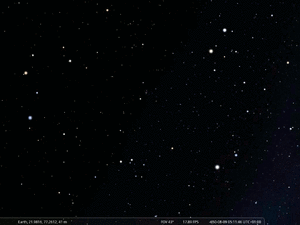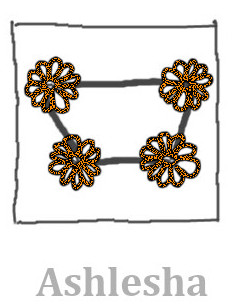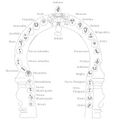Ashlesha: Difference between revisions
No edit summary |
No edit summary |
||
| Line 1: | Line 1: | ||
{{DISPLAYTITLE:Ashlesha (आश्लेषः)}} |
{{DISPLAYTITLE:Ashlesha (आश्लेषः)}} |
||
| ⚫ | |||
[[File:9 Ashlesha stellarium.gif|thumb|The 9th Nakshatra, Ashlesha, consists of five stars and is identified with the head of Hydra (WGSN 2025).]] |
[[File:9 Ashlesha stellarium.gif|thumb|The 9th Nakshatra, Ashlesha, consists of five stars and is identified with the head of Hydra (WGSN 2025).]] |
||
[[File:Ashlesha nakshatras in Temple draw+lbl 4ase.jpg|thumb|The 9th Nakshatra, Ashelesha nakshatra in Tirupperunthurai (Athmanathaswamy temple) near Aranthangi, India, 10th century CE. (SMH 2025).]] |
|||
Āśleṣā (आश्लेषा), "The Embrace", is the Sanskrit name for an asterism in [[Hydra]], the head of the Watersnake (δ, ε , η, ρ, and σ Hydrae). It is considered the ninth of the traditional Nakṣatras (lunar stations) in the Vedic culture that predates Hinduism but was taken over by it. |
Āśleṣā (आश्लेषा), "The Embrace", is the Sanskrit name for an asterism in [[Hydra]], the head of the Watersnake (δ, ε , η, ρ, and σ Hydrae). It is considered the ninth of the traditional Nakṣatras (lunar stations) in the Vedic culture that predates Hinduism but was taken over by it. |
||
| Line 7: | Line 7: | ||
==Etymology and History== |
==Etymology and History== |
||
| ⚫ | |||
'''Name Variants:''' |
'''Name Variants:''' |
||
| Line 21: | Line 19: | ||
==== Identification ==== |
==== Identification ==== |
||
Normally, five stars are drawn and they are identified with the stars in Hydra; δ, ε , η, ρ, and σ Hydrae. |
Normally, five stars are drawn and they are identified with the stars in Hydra; δ, ε , η, ρ, and σ Hydrae. |
||
The Yogatara (the main star) of the Vedic nakshatra is ε Hya. It was historically considered representative for the nakshatra and, thus, named after it by the IAU WGSN. |
The Yogatara (the main star) of the Vedic nakshatra is ε Hya. It was historically considered representative for the nakshatra and, thus, named after it by the IAU WGSN. |
||
=== Transfer and Transformation === |
|||
<gallery> |
|||
File:Ashlesha nakshatras in Temple draw+lbl 4ase.jpg|Ashlesha nakshatra in Tirupperunthurai (Athmanathaswamy temple) near Aranthangi, India, 10th century CE. (SMH 2025). |
|||
| ⚫ | |||
File:柳宿(仏像図彙).png|Ashlesha in Chinese |
|||
File:Naga ashlesha bali pooja.jpg|Bali naga "Ashlesha" |
|||
| ⚫ | |||
File:Nakshatras in Temple draw+lbl 4ase.jpg |
|||
File:Nakshatra temple magDraw lbl.jpg |
|||
</gallery>[[File:Naga ashlesha bali pooja.jpg|thumb|Naga ashlesha bali pooja]] |
|||
==Mythology== |
==Mythology== |
||
Revision as of 09:37, 30 October 2025
Āśleṣā (आश्लेषा), "The Embrace", is the Sanskrit name for an asterism in Hydra, the head of the Watersnake (δ, ε , η, ρ, and σ Hydrae). It is considered the ninth of the traditional Nakṣatras (lunar stations) in the Vedic culture that predates Hinduism but was taken over by it.
Ashlesha is also a modern star name adopted by the International Astronomical Union in the IAU-Catalog of Star Names (IAU-CSN). Its origin is Indian. It is the name of HIP 43109 (ε Hya, HR 3482) in the constellation Hya.
Etymology and History
Name Variants:
- Āshleshā,
- Ashlesha,
- Ahya,
- Phanibha,
- Sarpa
Origin
Identification
Normally, five stars are drawn and they are identified with the stars in Hydra; δ, ε , η, ρ, and σ Hydrae. The Yogatara (the main star) of the Vedic nakshatra is ε Hya. It was historically considered representative for the nakshatra and, thus, named after it by the IAU WGSN.
Transfer and Transformation
Mythology
IAU Working Group on Star Names
The name was adopted by the IAU WGSN on 2018/06/01.
Weblinks
- Website of the IAU WGSN: https://exopla.net/













